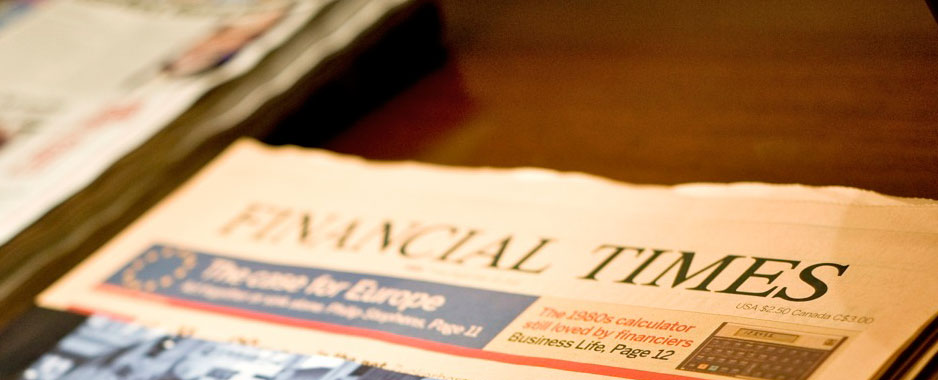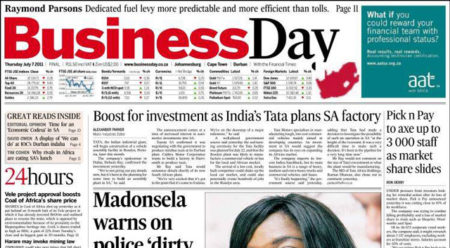
Over the past 30 years, my relationship with the pink paper has progressed, like all good love affairs, from wild passion to mature adoration and finally to an enduring life-long commitment. I am putting pen to paper not because I am considering divorce but because I am preparing myself for imminent physical separation for only the second time since I first encountered the Financial Times in 1981.
I am in mourning. From 26 July 2013, the FT will no longer be printed in Johannesburg. Yes, there is its very own app. It is handsome, it is user-friendly and it gives me access to every piece of news and analysis, and more, that the printed edition offers. But it’s not the same. I will miss my morning ritual of a piping hot cup of coffee and a crisp copy of the FT.
The Saturday FT Weekend front page won’t be on my Spar supermarket shelf any more, or on the pavement outside Fournos in Dunkeld, or in stacks at the entrance to Exclusive Books, or in the hands of the newspaper vendor on the corner of 6th and 4th avenues in Parkhurst. The very thought saddens me.
Not that it was love at first sight. My first encounter with the paper was as a rookie subeditor on the run from South Africa. This was May 1981. My shift began at 3.30pm and finished at midnight. My job was to check the weather report, which was then published on the back page. The highlight of the evening was sipping a pint of bitter in a local pub during our allotted 45-minute supper break. I would cycle back to my lover and our refuge in Fulham through deserted London streets.
A few months later, I was running the gauntlet to full-time employment. The scales were tipped in my favour when I correctly answered the question: What is the difference between a percentage and a percentage point? I cannot recollect how or why I knew the answer but by August I was on the payroll.
I fell in love not long after. I was promoted from the weather column to writing and editing the “News Briefing” on the front page. It sparked an adrenalin rush that would fuel my affection for decades to come. My responsibility was to identify the top 11 stories in the paper that day, summarise each in 30 words and write headlines for them. I went into work every afternoon in a state of terrified apprehension. Would my choices pass muster with the chief subeditor? Could I write all 11 flawlessly, without a single error or redundant word?
In a sense my apprenticeship at the FT never ended: one was simply followed by another. I was never given a job without being taught how to perfect the one in hand. It was relentless, exhausting and exhilarating. Mistakes were not tolerated, so you didn’t make them. Praise was seldom forthcoming. The paper was run by Englishmen, nearly all of whom were alumni of Balliol College, Oxford. Demonstrative they weren’t. But there was palpable pride when a particularly great paper came off the hot metal presses.
I believe the secret of the paper’s success is that it is deeply ideological without being blinded by its beliefs. The FT, which under its current editor Lionel Barber is published under the rubric “without fear and without favour”, is unapologetic in its support of capitalism. But it is not inured by the power of markets or to the damage they can do if left unfettered. At its core, the paper understands the interplay between economics and politics and markets. It has a sensibility that informs its coverage of powerful elites as well as corrupt political systems, seeing them as equally dangerous.
The paper has also never been afraid to hire men and women with radically different ideological perspectives and beliefs.
But in the end, what distinguishes the FT from other papers is the quality of its journalism. It has perfected a style of news writing that unpacks complexity and offers clarity, even when the subject matter is dense and arcane. Its opinion columns are richly diverse. Some are snortingly funny.
It doesn’t, however, always get it right. It didn’t support sanctions against South Africa, which I still believe was a travesty. It was so overcome with excitement after the fall of communism in the Soviet Union, it failed to understand that institutional frameworks and governance structures needed to be built for any decent form of capitalism to develop.
It came to its senses, but years after the worst damage had been done.
At times, it has also been mesmerised by the power of financial markets, failing to comprehend the damage they were doing, and still do.
And, finally, I think the FT has missed a trick in covering Africa. It remains caught in a postcolonial paradigm that portrays Africa as a collection of loser nations with little going for them. The truth is that Africa, just like China and many other developing countries and regions, is far more complex. The continent is rich with stories of extraordinary achievement and economic development and growth. They are just not appearing in the FT.
But no partner is perfect, no love affair without its flaws. I will continue to consume the pink ‘un every day. But I will miss its touch.
- Caroline Southey is speech writer for Absa group CEO Maria Ramos. She writes in her personal capacity
- The piece was first published in the Mail & Guardian




